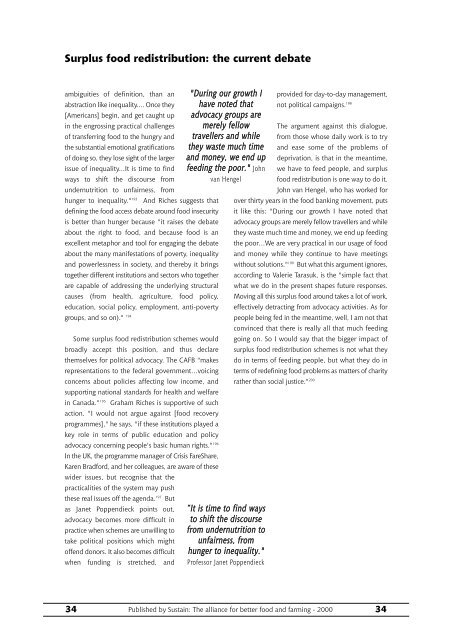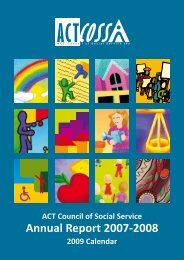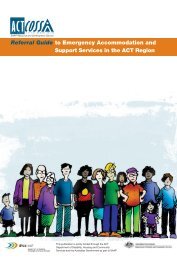Too much and too little? Debates on surplus food redistribution
Too much and too little? Debates on surplus food redistribution
Too much and too little? Debates on surplus food redistribution
Create successful ePaper yourself
Turn your PDF publications into a flip-book with our unique Google optimized e-Paper software.
Surplus <strong>food</strong> redistributi<strong>on</strong>: the current debate<br />
ambiguities of definiti<strong>on</strong>, than an<br />
abstracti<strong>on</strong> like inequality.... Once they<br />
[Americans] begin, <str<strong>on</strong>g>and</str<strong>on</strong>g> get caught up<br />
in the engrossing practical challenges<br />
of transferring <strong>food</strong> to the hungry <str<strong>on</strong>g>and</str<strong>on</strong>g><br />
the substantial emoti<strong>on</strong>al gratificati<strong>on</strong>s<br />
of doing so, they lose sight of the larger<br />
issue of inequality...It is time to find<br />
ways to shift the discourse from<br />
undernutriti<strong>on</strong> to unfairness, from<br />
hunger to inequality." 193 And Riches suggests that<br />
defining the <strong>food</strong> access debate around <strong>food</strong> insecurity<br />
is better than hunger because "it raises the debate<br />
about the right to <strong>food</strong>, <str<strong>on</strong>g>and</str<strong>on</strong>g> because <strong>food</strong> is an<br />
excellent metaphor <str<strong>on</strong>g>and</str<strong>on</strong>g> <str<strong>on</strong>g>too</str<strong>on</strong>g>l for engaging the debate<br />
about the many manifestati<strong>on</strong>s of poverty, inequality<br />
<str<strong>on</strong>g>and</str<strong>on</strong>g> powerlessness in society, <str<strong>on</strong>g>and</str<strong>on</strong>g> thereby it brings<br />
together different instituti<strong>on</strong>s <str<strong>on</strong>g>and</str<strong>on</strong>g> sectors who together<br />
are capable of addressing the underlying structural<br />
causes (from health, agriculture, <strong>food</strong> policy,<br />
educati<strong>on</strong>, social policy, employment, anti-poverty<br />
groups, <str<strong>on</strong>g>and</str<strong>on</strong>g> so <strong>on</strong>)." 194<br />
Some <strong>surplus</strong> <strong>food</strong> redistributi<strong>on</strong> schemes would<br />
broadly accept this positi<strong>on</strong>, <str<strong>on</strong>g>and</str<strong>on</strong>g> thus declare<br />
themselves for political advocacy. The CAFB "makes<br />
representati<strong>on</strong>s to the federal government…voicing<br />
c<strong>on</strong>cerns about policies affecting low income, <str<strong>on</strong>g>and</str<strong>on</strong>g><br />
supporting nati<strong>on</strong>al st<str<strong>on</strong>g>and</str<strong>on</strong>g>ards for health <str<strong>on</strong>g>and</str<strong>on</strong>g> welfare<br />
in Canada." 195 Graham Riches is supportive of such<br />
acti<strong>on</strong>. "I would not argue against [<strong>food</strong> recovery<br />
programmes]," he says, "if these instituti<strong>on</strong>s played a<br />
key role in terms of public educati<strong>on</strong> <str<strong>on</strong>g>and</str<strong>on</strong>g> policy<br />
advocacy c<strong>on</strong>cerning people's basic human rights." 196<br />
In the UK, the programme manager of Crisis FareShare,<br />
Karen Bradford, <str<strong>on</strong>g>and</str<strong>on</strong>g> her colleagues, are aware of these<br />
wider issues, but recognise that the<br />
practicalities of the system may push<br />
these real issues off the agenda. 197 But<br />
as Janet Poppendieck points out,<br />
advocacy becomes more difficult in<br />
practice when schemes are unwilling to<br />
take political positi<strong>on</strong>s which might<br />
offend d<strong>on</strong>ors. It also becomes difficult<br />
when funding is stretched, <str<strong>on</strong>g>and</str<strong>on</strong>g><br />
""DDuurriinngg oouurr ggrroowwtthh II<br />
hhaavvee nnootteedd tthhaatt<br />
aaddvvooccaaccyy ggrroouuppss aarree<br />
mmeerreellyy ffeellllooww<br />
ttrraavveelllleerrss aanndd wwhhiillee<br />
tthheeyy wwaassttee mmuucchh ttiimmee<br />
aanndd mmo<strong>on</strong>neeyy,, wwee eenndd uupp<br />
ffeeeeddiinngg tthhee ppoooorr.."" John<br />
van Hengel<br />
““IItt iiss ttiimmee t<str<strong>on</strong>g>too</str<strong>on</strong>g> ffiinndd wwaayyss<br />
t<str<strong>on</strong>g>too</str<strong>on</strong>g> sshhiifftt tthhee ddiissccoouurrssee<br />
ffrroomm uunnddeerrnnuuttrriittiio<strong>on</strong>n t<str<strong>on</strong>g>too</str<strong>on</strong>g><br />
uunnffaaiirrnneessss,, ffrroomm<br />
hhuunnggeerr t<str<strong>on</strong>g>too</str<strong>on</strong>g> iinneeqquuaalliittyy..""<br />
Professor Janet Poppendieck<br />
provided for day-to-day management,<br />
not political campaigns. 198<br />
The argument against this dialogue,<br />
from those whose daily work is to try<br />
<str<strong>on</strong>g>and</str<strong>on</strong>g> ease some of the problems of<br />
deprivati<strong>on</strong>, is that in the meantime,<br />
we have to feed people, <str<strong>on</strong>g>and</str<strong>on</strong>g> <strong>surplus</strong><br />
<strong>food</strong> redistributi<strong>on</strong> is <strong>on</strong>e way to do it.<br />
John van Hengel, who has worked for<br />
over thirty years in the <strong>food</strong> banking movement, puts<br />
it like this: "During our growth I have noted that<br />
advocacy groups are merely fellow travellers <str<strong>on</strong>g>and</str<strong>on</strong>g> while<br />
they waste <str<strong>on</strong>g>much</str<strong>on</strong>g> time <str<strong>on</strong>g>and</str<strong>on</strong>g> m<strong>on</strong>ey, we end up feeding<br />
the poor…We are very practical in our usage of <strong>food</strong><br />
<str<strong>on</strong>g>and</str<strong>on</strong>g> m<strong>on</strong>ey while they c<strong>on</strong>tinue to have meetings<br />
without soluti<strong>on</strong>s." 199 But what this argument ignores,<br />
according to Valerie Tarasuk, is the "simple fact that<br />
what we do in the present shapes future resp<strong>on</strong>ses.<br />
Moving all this <strong>surplus</strong> <strong>food</strong> around takes a lot of work,<br />
effectively detracting from advocacy activities. As for<br />
people being fed in the meantime, well, I am not that<br />
c<strong>on</strong>vinced that there is really all that <str<strong>on</strong>g>much</str<strong>on</strong>g> feeding<br />
going <strong>on</strong>. So I would say that the bigger impact of<br />
<strong>surplus</strong> <strong>food</strong> redistributi<strong>on</strong> schemes is not what they<br />
do in terms of feeding people, but what they do in<br />
terms of redefining <strong>food</strong> problems as matters of charity<br />
rather than social justice." 200<br />
34 Published by Sustain: The alliance for better <strong>food</strong> <str<strong>on</strong>g>and</str<strong>on</strong>g> farming - 2000 34













